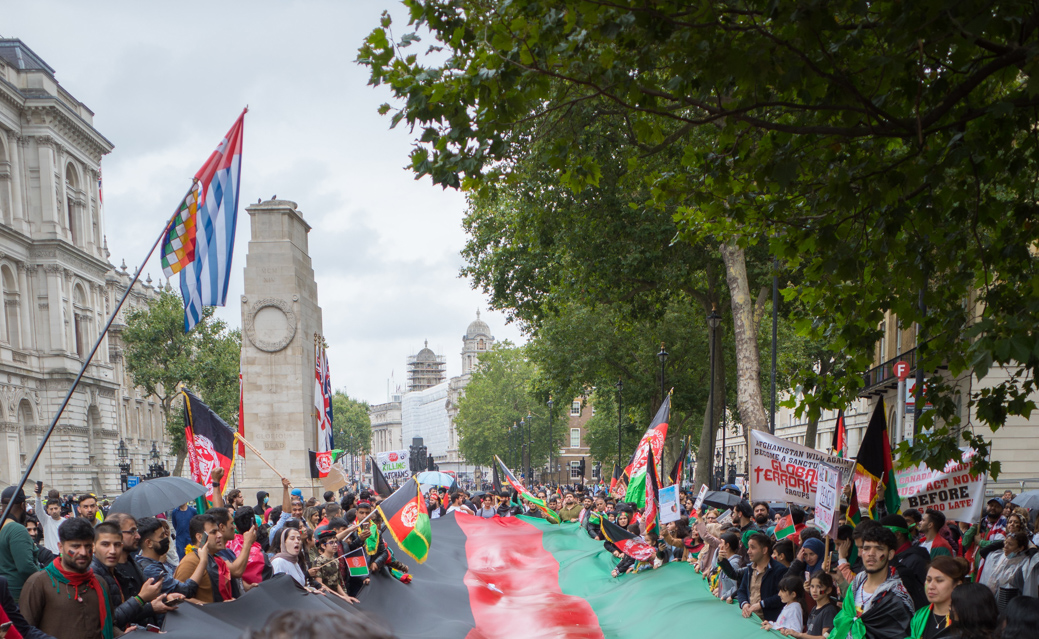Taliban’s reign of terror begins
The world has failed Afghanistan again, and it’s time we step up and help.
Afghanistan has once again plunged into the darkness. Over the month of August, the world witnessed the Taliban’s powerful and successful conquest in Afghanistan. The insurgency group gained territory and made advances in Afghanistan as the United States started the withdrawal process. This evacuation is part of an agreement made between former President Donald Trump and the Taliban last year.
On August 15, 2021, the Taliban took over the Afghan capital city of Kabul as President Ashraf Ghani fled the country. Without help from the U.S. military or a commander-in-chief, the Afghan army crumbled and the Taliban claimed control of the country. What came next was nothing short of absolute chaos, as evacuation of foreign nationals and their Afghan partners wreaked havoc at Kabul International Airport.
Horrific scenes emerged and circulated in the news and social media, including videos of people falling off flying aircrafts in their last desperate attempt to escape Taliban rule. News and social media feeds flooded with videos of children, including one of a baby being handed over by desperate mothers to U.S. military forces in hopes of a better life. Explosions and stampedes around the airport claimed many lives and injured hundreds of Afghan civilians, as well as more than a dozen U.S. soldiers.
Afghans all around the world, including Afghan Canadians, watched in despair as the Afghan flag was lowered across the country and replaced by the white Taliban flag that has been a symbol of horror; a bitter reminder of the dark times endured over the past twenty years. Their homeland transformed from a poor but joyous land, into a place where people fear leaving their houses. Afghans living abroad received phone calls from panicking relatives asking for a way out and watched videos of men and women, university professors and students, burning their degrees, documents, and books–careful not to show their faces–so they might go unnoticed during house searches conducted by Taliban.
The Afghan diaspora marched the streets in peaceful protests. They continued to post on social media day after day to raise awareness of the severity of this crisis, and to oppose Pakistani interference and the return of the brutal Taliban regime.
Now that the initial shock and heartache is subsiding, some real concerns and past traumas are resurfacing. The most pressing issue is the lack of funds and aid going into the country, as the U.S. has frozen all of Afghanistan’s assets and development funds. Banks in Afghanistan have also limited their operations and the amount that people can withdraw from their accounts. This is meant to prevent mass withdrawal of funds and collapse of the already-weak economy. A drop in the value of Afghan currency and border and road closures have halted trade. As a result, the people of Afghanistan are preparing for food shortages, while many domestically displaced people are already desperately in need of humanitarian relief.
Another major concern is whether the Taliban will uphold women’s rights to education, work, and public participation. Historically, the Taliban has confined women to their houses as housewives or obedient daughters, only being allowed to leave with a male escort.
Since the Taliban regime was overthrown in 2001, women have fought for their place in the classroom, workplaces, parliament, and society as equal and valuable members. Today, this is in jeopardy. The Taliban claim to now respect women’s rights and freedoms, if these freedoms fit into their version of Islam. What exactly their version of Islam permits, and whether they will stay true to these promises is in the air.
The potential for increased terrorist presence in Afghanistan, and the subsequent implications for regional and global security, alarms many western countries now more than ever. This may trigger another wave of Islamophobia and Afghanophobia in the West. It will likely provoke various sanctions on Afghanistan that may keep the country in a never-ending cycle of poverty and short-termism—the ultimate price paid by innocent civilians. What these citizens need right now is a secure society, stable economy, resumed schooling for their sons and daughters, and a small sparkle of hope that tomorrow can be better than today.
Canada and the international community need to work together to provide humanitarian aid—food and medicine—to the country right away. The international community has a lot of leverage over the Taliban. Now is the time for them to act to secure human rights, including women’s rights, and basic freedoms of speech, press, movement, and association. They need to work with the remaining Afghan officials from the previous government and the Taliban to revive peace negotiations and set the stage for democracy. They need to decide and work towards stopping other insurgency groups, such as ISIS-K, once and for all. The international community has this power, they just need to be decisive in their action.
We, as citizens of Canada, need to talk about Afghanistan and the millions of innocent people who have lives, loved ones, hopes, dreams, and aspirations just like us. We need to ensure the world does not forget about them.

